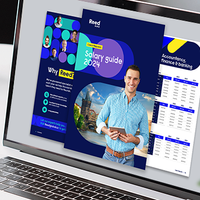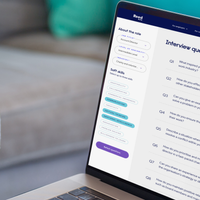- Featured
Reed’s Czech Republic salary guide 2025
Our 2025 Czech Republic salary guide looks at average salaries and benefits across eight sectors. The guide uses data from jobs posted in the Czech Republic to highlight key trends and insights, enabling you to benchmark the average salaries for your workforce across the Czech Republic, or find out what you could be earning.The Czech Republic is making a slow recovery from the pandemic, hampered by inflation and cost of living pressures.
- Article
Redundancy letter templates & examples
Making redundancies is never a pleasant experience, but it’s sometimes unavoidable and employers need to ensure they navigate the process with sensitivity and professionalism, and adhere to the law, or they may face employment tribunals and unfair dismissal claims.A redundancy letter is a written communication from an employer to an employee that informs them of their job loss due to a reduction in the workforce. To help employers manage this process and ensure they provide employees with clear and concise information, we have compiled a selection of adaptable redundancy letter templates for the various stages of the redundancy procedure.When would you need to write a redundancy letter?Employers may have to write redundancy letters in the following circumstances: Economic downturnsDuring a time of economic decline or recession, businesses may experience a reduction in revenue, leading to reduced demand for their products or services. In such circumstances, businesses may look to reduce their workforce to cut costs. RestructuringCompanies may need to restructure their operations, departments, or teams due to changes in the market, mergers and acquisitions, or changes in leadership, which could lead to redundancies. Technological advancementsWith advancements in technology, businesses may require less manual labour, leading to a reduction in the workforce. Employers may have to make employees redundant where their jobs have been automated or outsourced. What is the difference between voluntary and compulsory redundancy?Voluntary redundancy is when an employer offers an employee the option to leave their job in exchange for a financial package, which could include a lump sum payment, extended notice period, and other benefits. Employees who accept voluntary redundancy do so voluntarily, and their decision is not influenced by their employer.In contrast, compulsory redundancy is when an employer selects an employee to leave their job due to a reduction in the workforce, restructuring, or other reasons. Employees who are made redundant involuntarily do not have a choice in the matter and may be entitled to statutory redundancy pay and other benefits.What are the stages of a redundancy process? The redundancy process can be broken down into stages and logical steps that employers can follow. The stages are: preparation, selection, individual consultations, notice of redundancy, appeals (if applicable), and termination.Stage one: PreparationDuring the preparation stage, you will assess whether redundancy is the only option and is completely necessary before beginning the process. If you are concerned with your employee’s performance or behaviour, then you should go down the disciplinary route instead.Redundancy is a type of dismissal where the employee’s job is no longer required. Ensure that you have covered all alternative options and if you have concluded that redundancy is essential, establish a time frame and prepare the relevant documentation.Stage two: SelectionAt this stage, you will be selecting the people who are under consideration for redundancy. You’ll need to determine the criteria for selecting those employees which should be objective and fair across the workforce.Additionally, now is the time to inform employees of the upcoming redundancies. This should also include those who are not under consideration. You should explain that there is the risk of redundancy, the reason why it’s necessary, roughly how many redundancies you're considering, and what will happen next.Stage three: Individual consultationsThe consultations stage is a hugely important part of the redundancy process, and it’s essential that employers look at this as an open discussion with the employee, rather than using this time to just inform them of their potential redundancy.You should explain why they have been selected and discuss alternative employment in the company. Employees will have the chance to make suggestions as to how the business can retain them and these suggestions should be considered fairly, or the employer may face unfair dismissal claims.Note: there are legal time frames regarding consultations, so make sure you adhere to these.Stage four: Notice of redundancyOnce you have finished consulting with everyone and made your decision, you should meet with each at-risk employee to discuss the outcome. Ideally, do this face to face, but if this is not possible, organise a phone call.Those who have been selected for redundancy should also receive confirmation in writing, by letter or email. We have included a redundancy notice letter template for your ease.Stage five: AppealsIf an employee feels they have been unfairly chosen for redundancy or if they think there were discriminatory issues in the process, it is essential to offer them the opportunity to appeal within a reasonable time frame after they have received their redundancy notice. This could be, for instance, five days. The employee should submit their reasons for appeal in writing. Once you receive an appeal, you should arrange a meeting with the employee as soon as possible.If it becomes clear that the employee was selected unfairly but you still need to make the role redundant, you must manage the situation with great care. This could mean ending the employment of another employee who was informed their job was secure. It is important to communicate clearly and openly with your staff, rectify any issues with the process, and ensure a fair selection procedure is carried out. If serious problems are identified, you may need to repeat the entire redundancy process.If you decide to reject the appeal, the employee's redundancy dismissal, notice, and pay will continue as before.Stage six: TerminationThis is the final stage of the redundancy process where the employment contract is terminated. During this stage, you should be supportive and give your employee reasonable time to find another job while they work their notice period.All employees who have been with the company for more than two years qualify for a statutory redundancy payment. Provide the employees with a written record of how the statutory redundancy payment has been calculated and what they will receive.What should be included in a redundancy letter?The redundancy letter to the employee should clearly state the reasons for the employment termination and the terms of their departure. Here are some key pieces of information that should be included in a redundancy letter:Reason for redundancy: The letter should clearly state the reasons for the redundancy, such as economic downturn, restructuring, or technological advancements.Selection criteria: Employers should explain the selection criteria used to determine which employees are being made redundant. This could include factors such as length of service, skills and qualifications, and job performance.Notice period: Employers should provide details of the employee's notice period, including the start and end dates, as well as any entitlements to pay in lieu of notice.Redundancy pay: The letter should provide information on the employee's entitlement to statutory redundancy pay, as well as any additional redundancy pay provided by the employer.Benefits: Employers should explain what happens to the employee's benefits, such as healthcare, pension, and life insurance, after they leave.Support: Employers should offer support to the employee during this difficult time, including assistance with finding new employment opportunities and access to training programmes.To help you navigate this challenging process, we have put together a selection of redundancy letter templates that can be used at various stages throughout the process. These include:Redundancy consultation letterRedundancy consultation outcome letterInvitation to redundancy outcome meeting letterNotice of redundancy letter
- Article
How to effectively manage staff redundancies
Due to the current economic climate, UK businesses may be presented with some difficult decisions to make regarding their workforce, including redundancy.Employers may have to write redundancy letters during economic downturns - when the business is experiencing a reduction in revenue, when restructuring operations or departments due to changes in the market, or when technological advancements mean jobs have become automated or outsourced.Managing and making staff redundancies across a business is often an unpleasant but necessary task that many employers may have to consider when reducing their headcount. When faced with the prospect of making redundancies, it’s important for employers to manage the process effectively and efficiently to minimise the impact on both the affected employees and the entire business.Here are some steps employers can take to manage staff redundancies:Create a redundancy planHaving a redundancy plan in place will help employers effectively manage every stage of the process, from consultation and planning to notification and evaluation. It’s important to make sure the initial plan includes checks to see if there is a genuine redundancy situation, what the timescales are, and how consultation will take place.For each stage of the plan, a record needs to be kept, ensuring the entire process is accountable to be delivered efficiently and legally. Redundancy plans should include: An explanation as to why redundancies are being made A timetable outlining next stepsThe meeting process for all affected employeesThe meeting process for all unaffected employeesAn outline of the redundancy criteria and selection processHow the announcements will be madeIf redundancies are in fact unavoidable, the latter stages of the plan should also include selection, notices and payments.Be lawful, fair and transparentRedundancy can be seen as a fair reason for dismissal, but should only be used in certain circumstances where the employee’s role no longer exists and/or is no longer required within the business.As such, when considering employees for redundancy, employers should use a selection criteria that is fair and objective, which might include an employee’s:SkillsExperiencePerformanceLength of serviceEmployers must comply with employment laws and regulations when managing redundancies. According to the Equality Act 2010, it’s unlawful to make someone redundant by reason of a protected characteristic. These include age, sex, sexual orientation, marital status, disability, race or religion.Following the correct legal procedure is imperative, as failure to do so can lead to wrongful dismissal claims. Employers should consult with employees and/or their representatives when making decisions that affect their jobs.Offer clear communicationAs with most situations that concern employees, communication is key when it comes to managing redundancies. Be open and honest with employees about the situation – it always helps to explain the reasons for the redundancy and provide as much information as possible about the process.This information can be hard to hear, so employers are encouraged to act sensitively to the emotions of those affected and provide support where necessary. For that reason, the process needs to be transparent, and employees should know what to expect throughout.Alongside the employee, it’s important to remember that redundancies can impact the business in more ways than one – and stakeholders with an interest in the organisation should also receive clear communication. Anyone from customers to suppliers and investors have the right to be informed about any changes, but the focus should be on reassuring them about the future of the business.Remember, communication is there to help to manage any negative impact on the organisation’s reputation or relationships.Provide employee support and guidanceRedundancy can be a traumatic experience for any employee. Therefore, providing the necessary support and guidance to help affected workers cope with the news can go a long way, not only in terms of maintaining best practice but for business reputation.Employers can help employees through:Finding new employmentAccessing training and reskilling opportunitiesCV support and career coachingJob search advice and recommendationsAs redundancy is a last option, it’s worth considering whether there are any suitable alternative roles within the business that impacted employees could be offered.Anyone who has worked for their employer for at least two years at the time their job ends should be offered an alternative role if one is available, or at least be made aware of any opportunities across the business. This may involve individuals undertaking training or upskilling to take on different roles – but if the offer isn’t taken up, the employee will be deemed as dismissed through redundancy and be entitled to receive statutory redundancy pay.This payment is there to help employees during the transition period as they look for new employment, and should be calculated correctly and paid in a timely manner.Consider remaining employeesRedundancies can have a significant impact on remaining employees, who may feel demotivated, stressed, or uncertain about their own job security. As much as the focus may be on creating a supportive environment for those leaving the company, be mindful to keep your existing workforce updated and supported throughout the stressful period.While those workers may not have faced dismissal, they may have been affected by witnessing the experience of their colleagues, which can negatively impact their morale. This can be harmful to the working environment, business operations and to employee performance.Continue to learn and adaptManaging redundancies can be a difficult process, but it can also provide an opportunity for an organisation to learn from the experience and improve upon its practices. Employers should conduct a post-redundancy review to evaluate the situation and identify any areas for improvement so, if it does need to happen again, the business is better prepared.During the redundancy talks, it may be worth taking any feedback on board from the affected employees. This can be used to make changes to any practice and policy currently in place, and, most importantly, improve the support and guidance provided. Proactive measures can help build resilience and better prepare managers for any future challenges.Employers should also look at their redundancy process as a whole, making sure line managers are able to confidently deal with these types of situation. According to research by employment law support firm WorkNest, 74% of employers aren’t providing any training to their line managers on how to handle redundancies – indicating the scale of potential emotional damage that could be routinely occurring though no fault of their own.Staff redundancies can be a challenge, but it’s imperative that the process runs as smoothly as possible. By taking the time to plan, execute and evaluate the task, employers can minimise the impact that redundancies can have on all involved.
- Article
Interview question generator - New Reed AI tool
Why should recruiters and hiring managers use our tool?Well-crafted interview questions are essential for determining an interviewee's skills, experience, and fit for the role.If you are looking for good interview questions for recruiters or managers, our interview question generator is your go-to resource for fast, comprehensive interview question generation, providing you with a wide range of relevant and effective questions to choose from.Our tool uses advanced AI algorithms to generate a list of interview questions to ask candidates that are tailored to the specific requirements of the role and your company. Using the tool ensures that the questions you ask at an interview are relevant, effective, and comprehensive, allowing you to gain a deeper understanding of each interviewee’s strengths and weaknesses. Our interview question generator will save you time and effort, while ensuring that you are asking the right questions to identify the best candidates for your open positions.Tailoring questions to your industry and roleOur interview question generator will craft a set of interview questions to suit any role, in any sector, across a range of seniority levels, from entry level to c-suite.Helping recruiters and managers craft better interview questionsBy highlighting your top-three most sought-after soft skills, this AI-powered interview question generator will align with your hiring needs, helping you uncover the best talent to help your team thrive.Helping hiring managers save timeWhat used to take hours of searching the internet for the best interview questions, will take you no more than five minutes.
- Article
Performance reviews: how to use them efficiently and effectively (downloadable template)
Annual appraisals are supposedly dead – but this is only true because once a year is not enough to effectively evaluate your employees. We explore how to optimise your performance reviews to grow your team.Employers are not required by law to conduct appraisals and reviews, but they do benefit all parties. If all the feedback you give your team members is through one annual appraisal, you’re doing your team a disservice and aren’t unlocking their full potential. Feedback should be far more regular to match the fast-paced environments we now work in.The value of appraisalsRecently, appraisals have been considered a dying practice by many employers who deem it a tick-box exercise with little value. However, when done well, and more frequently, these reviews are crucial for the development of your employees and have multiple benefits for both parties:-Ensuring employees understand their role and your expectations for them-Determining to what extent employees are meeting those expectations-Providing support and having an honest two-way discussion-Acknowledging and rewarding good performance-Nurturing your employees’ career progression-Increasing engagement and longevityA manager’s responsibility is to empower their people to do their work to the best of their ability and nurture their successes. Performance reviews are a chance to engage team members with regular, one-to-one, honest discussions. It’s not only a chance for the professional to receive feedback from you, but an opportunity for them to raise any concerns they have and to tell you what support they might need.Without appraisals, employees will still be evaluated, but without the same transparency and objectivity. It will simply exclude employees from the process. This could make them feel out of control of their own futures and unaware of what they can do to improve. Providing honest feedback, even if it is a hard conversation to have, allows them the opportunity to upskill themselves and for you to show you want to help them improve.Conducting a successful performance reviewFirstly, all parties involved need to understand the process and why it’s being conducted in the first place. What do you want to achieve from this meeting? Appraisals need to be structured to be effective. Performance template examples, like the template we have designed, can help you with this.Every appraisal should:Be as regular as your team needs it to be– The regularity of your performance reviews will depend entirely on your company, team and management style. With most companies changing much more rapidly, and employees learning in more fast-paced environments, annual appraisals will not be as useful as a more regular performance review. When it comes to feedback, little and often is the way to go.You might decide that once a month is best for your team members. However, it’s best to be flexible, and if monthly reviews aren’t working for individuals, try checking in with them more regularly than others. It’s all about the employee and your own judgement.Provide effective feedback– Fundamentally, all feedback must be honest and constructive. Without honesty, it will have no value to the person receiving it – positive or negative. Whether their performance has been excellent or less than satisfactory, you need to advise them on the next steps they should take to improve or grow further. All feedback must focus on the future and how your employee can move forward, rather than dwelling on past failures or becoming complacent following their successes.Set SMART goals– One of the most common mistakes employers make is setting vague goals. Employers must provide their employees with SMART (specific, measurable, attainable, realistic, time-bound) goals, that they can focus on achieving ahead of their next review. For example, you may want one of your employees to ‘make more sales’ but this doesn’t give them guidance or direction on how to achieve what you want them to.To turn this into a smart goal, it might become something like: ‘make eight sales a month, for six months, until you reach 48 sales by the end of this year’. Outlining the main goal, and the smaller steps they need to take to achieve their goals by a set deadline is much better for motivation and productivity. It’s also easier to measure and help them to stay on track to achieve their overall goal.Be a rewarding experience for employees– Appraisals should be an experience employees look forward to. They should leave feeling that their hard work and progress since the last review has been acknowledged and rewarded by their employer. If the response hasn’t been so positive, they should leave with an awareness of how to improve, through honest and constructive feedback and SMART goals.Be personalised to individuals– Each member of your team will have a different way of working and different needs. This should be accounted for in your performance reviews. Ideally, you would have a standardised performance review template that can be adapted to each person in your team. A one-size-fits-all approach doesn’t always work.If any of your team members have health issues which are affecting their work, take that into consideration and do your best to support them. It is illegal to discriminate against someone for their protected characteristics such as disabilities or neurodivergence. Likewise, be mindful of any personal issues your employee may be struggling with that may have a short-term impact on their performance. You must provide reasonable adjustments where possible to help them improve their performance.Download our free performance review templateto help you ensure your next review has a positive impact on your employees.
- Article
Best practice for creating an induction checklist for new staff
Inductions are vital to ensuring new staff settle into an organisation and make a positive impact. Using a straightforward induction checklist can make onboarding simpler and more effective.A concise and well-structured induction checklist for new staff can heighten the entire induction process, leading to seamless onboarding and, most importantly, allowing the new starter to hit the ground running.Using an induction checklist can remove some of the pressures managers and HR professionals face. We examine everything you need to know about an induction checklist.What is an induction checklist?An induction checklist outlines the activities set for a new employee to complete within the initial stages of their employment. Its purpose is to ensure objectives are met and organisational matters are understood and to avoid omission or duplication of information.A staple of the onboarding process, an induction checklist is a critical tool that has proven success in effectively managing new starters. It doesn’t, however, cover tasks that need to be done before the new employee arrives. Equipment, uniform, passwords and software access should be planned well in advance so that the new starter has everything they need from day one.The benefits of creating an induction checklistAn induction checklist helps your employee settle in quickly, giving them a sense of direction from the start of their career at an organisation. This will improve their overall productivity, through the checklist’s set tasks aimed at increasing their knowledge of the company, their rights and, ultimately, their responsibilities. Induction checklists don’t just benefit employees, they can also make a manager’s job simpler.During the induction process, an induction plan template helps ensure the right materials, policies, procedures, and workflows are all actioned and accounted for.Using a staff induction template prepares the new employee for each step, reducing any anxiety, while also making sure all necessary administrative areas are covered. A well-structured checklist can ensure the smooth running of the induction process and can also be transferable to most roles across multiple sectors.What should be included in an induction checklist?The activities and tasks listed in an induction checklist vary from organisation to organisation, depending on various elements including the size of the company and the sector or industry they fall under. Popular inclusions are as follows:Employee's personal informationThis section includes the name of the employee, their job title, staff ID number and start date. Some employee induction templates also include a detailed list of all paperwork that needs to be compiled and submitted to human resources on the first day (passport, p45, qualifications etc.).First day tasksEnsuring that new employees are familiar with their surroundings and the people around them is crucial on the first day of work. New employees should meet fellow team members and relevant managers, be assigned a workstation, issued with office ID badges and given a tour of the facility.Introduction to the companyAn introduction to the company should be conducted within the first week of the new starter joining the business. This gives the new employee the chance to learn more about the company's history, values, management style, objectives, products and services, organisational structure, and key stakeholders.Introduction to the roleMost importantly, the employee will need an understanding of how they fit into the organisation, their day-to-day tasks that integrate into the company's practices, their main responsibilities and priorities, as well as department-wide goals and objectives.Terms of employment, such as pension contributions, working hours, pay, lunch breaks, annual leave and claims and expenses should also be covered.Induction checklists should also include an organisation's code of conduct, discipline, absenteeism, and relevant policies. Other information such as office dress code, operating procedures and use of company resources need to be relayed to the employee.Health and safetyNew employees will need to attend training to learn the company's health and safety policies, including first aid, safety measures, emergency evacuations, firm alarm drills, as well as the location of fire extinguishers and first aid kits.One month reviewAfter one month in the role, it would be worth the new starter having an extended one-on-one meeting with their line manager to evaluate how they are adjusting to their role and whether there is a need for further training or development.Three-month reviewThe line manager should hold further discussions with the employee to review performance, pinpoint areas of improvement and set longer-term objectives, while adjusting any targets if the employee is either up to speed or slightly behind.Six-month reviewIf the employee is on a six-month probation, this is the point to decide whether to retain them, release them, or extend the probation if needed. If the new starter passes their probation period, objectives will then need to be set for the next six months. The six-month mark presents a prime opportunity to ask the employee for feedback on the induction process, what they think worked well and what they feel could be improved.Do remote employees need an induction checklist?They may not be in the office, but that doesn’t mean remote employees don’t need an induction checklist. In fact, an induction is even more important to remote employees, who can often feel isolated or become inadvertently left out. As remote onboarding becomes more common, use of an induction checklist should eventually become standard practice. Our free induction checklist template is designed to simplify the onboarding process and support your new starters through their first six months. Whether you are looking for guidance to use across your own company, or interested in learning more about what you need to include, our comprehensive checklist is an indispensable tool to help you and your new employees.Download the free checklist now.






